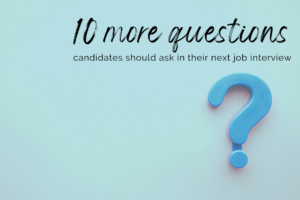|
|
It can be difficult to talk about yourself in a job interview. A lot of people feel uncomfortable discussing their strengths in an interview because they feel like they have to be good at sales to sell themselves.
Or, they feel like they’re bragging and they were taught it’s rude to brag about themselves. I always say it’s not bragging if you can back it up.
But if you still feel uncomfortable describing and selling yourself, here are six ways to do so without it feeling like bragging.
1. Use Others’ Words
If it feels awkward for you to talk about your strengths, try instead to use other people’s words. Think about the feedback you’ve received in the past from your supervisor, co-workers, or customers. What are the good things they’ve said about you and your work?
Then, word your responses to interview questions with the phrase, “My co-workers always comment on how I…” Or, “My supervisor says I’m good at…”
2. Give Examples in the Job Interview
Always use examples to illustrate what you say you’re good at. Do this by telling a story about a time when you’ve performed a certain task or skill, focusing on the positive results from your efforts.
Your stories are unique to you, and therefore set you apart from the other candidates who possess the same skills. Your stories are what make you memorable.
It’s best to organize these stories using the CAR method as described in my blog post “The Secret to Answering Behavioral Interview Questions.”
3. Exhibit Problem-Solving Skills
Show your problem-solving skills since you’re likely being hired to solve a specific problem.
If you can figure out before the interview what the main problem is they want the new person in the position to solve, come up with some ideas on how you would go about solving that problem.
Or, prepare a case study to share about how you’ve previously solved a similar problem in your past experience.
4. Show and Tell
Provide some tangible samples of your past work in the form of a professional portfolio. You can put together a hard copy of your portfolio to take with you to the job interview, and also have a digital format you can link to from your LinkedIn profile and resume.
When putting together a professional portfolio, remember to always choose quality samples of work over quantity. Also, make sure you’re not including anything your previous or current employer would consider to be confidential.
For more information on how to prepare a case study or present a professional portfolio, check out my on-demand program The 3 Super Powers of Successful Job Seekers.
5. Be Positive in the Job Interview
Always describe yourself in a positive light, even when asked about your weaknesses. Be honest, be humble, and show how you are overcoming or compensating for your weaknesses.
Then, know when to stop talking about your weaknesses (always keep this topic brief).
*Stay tuned for my upcoming blog post on how to answer the interview question, “What are your greatest weaknesses?“
6. Make It About Them
Focus on what’s most important to your audience, not necessarily what’s most important to you.
This requires knowing your audience and what they’re looking for most in a candidate. The list of required skills from the job ad is a good clue to what they’re interested in discussing.
Talk about those skills and how you’ve demonstrated them. Don’t spend too much time talking about a skill you have that’s not listed as a strong requirement for the job.
Also, make sure when answering questions (or when asking questions of your own), you present your thoughts in a way that shows you’re putting the company’s best interest above your own.
For example, when asked why should they hire you, don’t babble on about why the job would be good for you. Instead, talk about why you would be good for them.
I once had a client who, when I did a mock interview with her and she answered this question, she said they should hire her because it would be the next best step for her career and it would be a closer commute for her. We quickly corrected her response to show what she brought to the table that would benefit the company instead.
Another example is, instead of asking if a company provides work-life balance for their employees, ask, “How do you support your employees in ways that allow them to give their best to their jobs and the company?” This shows you’re not just thinking about yourself.
Job Interview Finesse
Interviewing can be tricky and nerve-wracking. It’s a delicate balance of putting your best foot forward and also making sure to interview the company, all the while remembering to put yourself in their shoes. With the above tips and other tips in this blog, you’ll learn how to handle the interview process with finesse!
Related Posts:
- The One Surprising Tip That Guarantees a Good Interview
- The Secret to Answering Behavioral Interview Questions
- How to Write a Resume: Make it About THEM, Not You
- On-demand Video Course: Steps to Acing the Interview and Reducing Your Interview Anxiety






